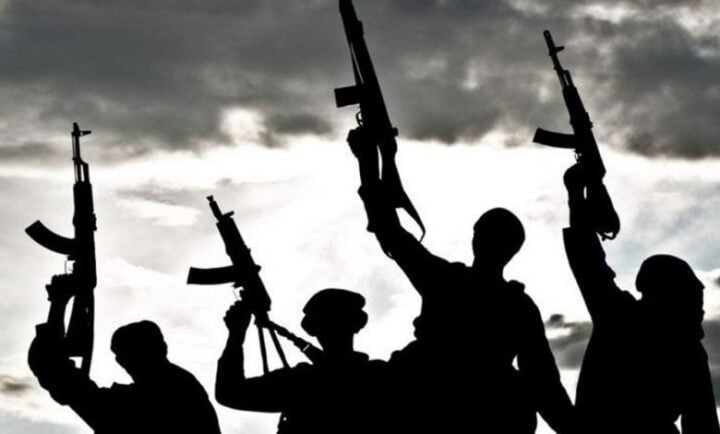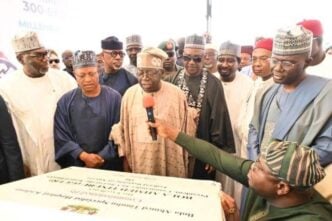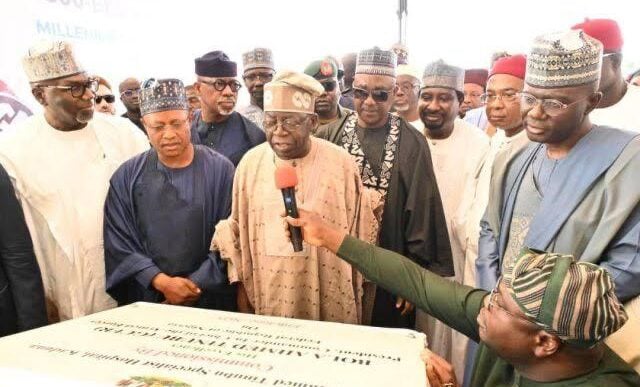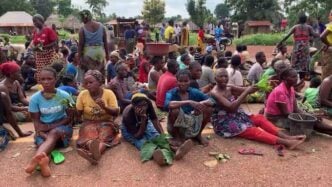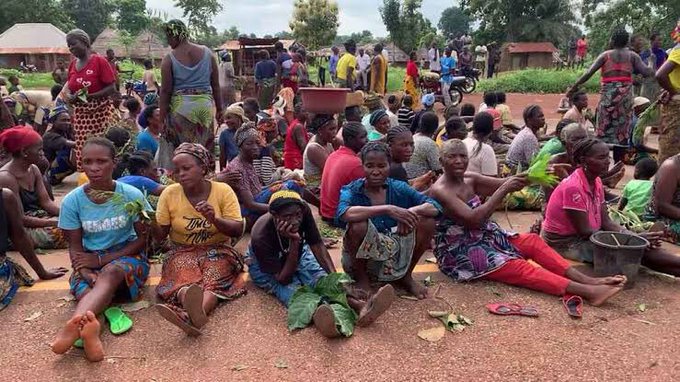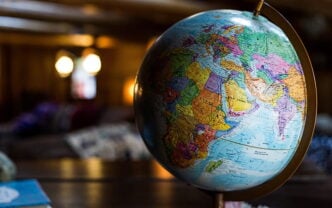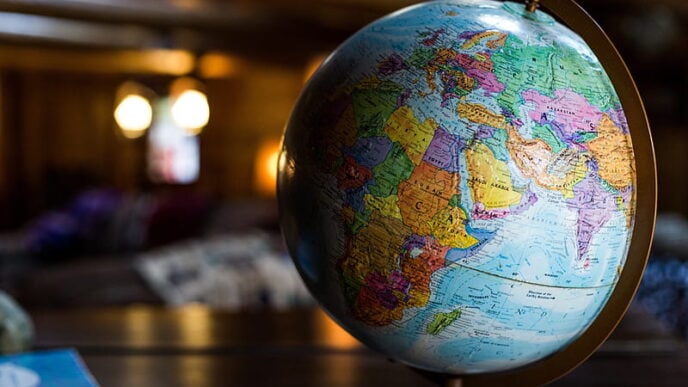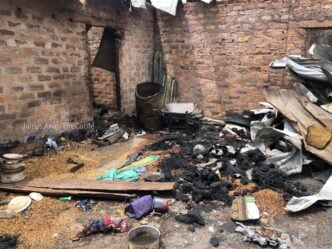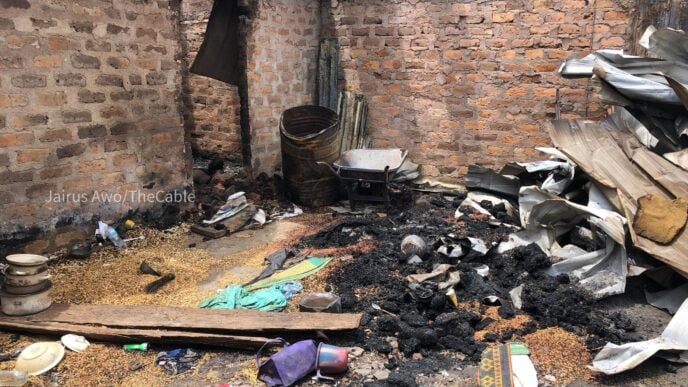File photo
BY ADEDOKUN SEYI
Violence in Nigeria exerts a toll far beyond the immediate human tragedy; the macabre arithmetic of lives lost and livelihoods shattered systematically erodes economic output. In June 2025 alone, the murder of over 200 individuals in Yelewata, Benue State, didn’t just claim lives; it consumed whole seasons of agricultural output, displaced around 3,000 people, and incinerated market stock, essentially obliterating local economic activity amid charred grain stores and burnt farm equipment. Similar attacks earlier in the year, such as the April 2022 Benue killings in multiple villages, killed dozens and sent farmers fleeing, highlighting a persistent pattern.
Nigeria’s GDP bears a hidden toll far larger than headline fiscal figures suggest: the tragic weight of lives lost through violence, banditry, terrorism, and ethno‑religious conflict. In 2020 alone, the Institute for Economics and Peace estimated that insecurity, including kidnappings, herdsmen attacks, Boko Haram insurgency, and communal violence, shaved 2.6% off Nigeria’s GDP, equivalent to about US$ 10.3 billion lost that year. Meanwhile, the BusinessDay/IEP analysis found that between 2007 and 2019, Nigeria spent a staggering US$1.34 trillion addressing violence–security budgets, disrupted industries, and destroyed infrastructure, amounting to nearly 30% of 2019 GDP.
Regionally, Nigeria leads Africa in the economic cost of violence. In 2020 alone, violence cost the nation approximately US$119 billion (PPP), about 11% of GDP, higher than South Africa, which lost 15% of its GDP to violence, and vastly more in absolute terms. In contrast, Ghana, the next African comparator, lost just US$11 billion that year. These losses stem not only from direct costs but also from the long-term drag on human capital, private investment, and productivity. Conflict in north-eastern Nigeria, which Boko Haram and ISWAP alone drive, subtracted $12.6–15.4 billion from the nation’s annual GDP in 2021, compared to a counterfactual where peace prevailed. UNICEF’s region-specific modelling places cumulative economic losses from 2008 to 2021 at $90–113 billion, with a projection that prolonged conflict may escalate total losses to US$150–200 billion in the decade ahead.
Advertisement
To grasp the human toll behind these numbers, consider the January 2022 Zamfara massacres, where over 200 villagers were killed in a strike against rural livelihoods that ripple through local GDP through agriculture, market access, and communal trust. Similarly, the December 2023 Plateau massacres saw around 200 people killed and over 500 injured, with homes and farmlands destroyed. Each violent episode dealt a fresh blow to economic regeneration. Ethnic violence in Plateau, especially herder–farmer clashes, has killed over 1,300 people since late 2023. These attacks erode investor confidence and threaten multi‑million‑dollar infrastructure projects, as financiers demand stability before committing capital. In Benue State, insecurity reduced crop and livestock outputs by approximately 0.21% and 0.31%, respectively, for every 1% increase in violence, devastating earnings for smallholder farmers and shrinking local contributions to the national GDP.
These economic wounds are compounded monthly. A report revealed that north‑central states, home to a collective GDP of ₦28 trillion, lost over 1,200 people in just three months of bandit violence in mid‑2023, with immediate shortages in agricultural production, tourism, and hospitality sectors. Meanwhile, child‑targeted violence, though less newsworthy, costs Nigeria US$ 6.1 billion annually – 1.07% of GDP – by reducing future workforce productivity. The knock‑on effects are stark. Insecurity raises security spending and deters foreign direct investment, which plummeted from US$23.99 billion in 2019 to just US$9.68 billion in 2020, and increases business costs, as manufacturers reported a drop in domestic raw material use from 64% to 56.5% due to supply chain disruptions. Border closures to counter violence further inflated food prices and fuelled black‑market activity.
Internationally, Nigeria’s GDP performance underperforms relative to its size. While Africa rebased its GDP and surged ahead following the inclusion of telecoms and Nollywood, insecurity has stifled Nigeria’s diversification beyond oil. Between 2015 and 2023, average GDP growth hovered around 2.1%, with unemployment exceeding 30% and deepening inequality. Worse still are the hidden opportunity costs. The trillions spent on security could have financed healthcare, schools, and roads. Instead, everyday emergencies like bandit raids or communal massacres govern the national budget. When supply chains are disrupted, small businesses close; schools shut; farmers flee their lands; investors reroute their capital.
Advertisement
The north-east’s Boko Haram insurgency compounds the burden, with estimates from 2008 to 2021 placing cumulative GDP loss from the insurgency at $90–113 billion, with annual damages in 2021 alone at $12.6–15.4 billion. These wounds are not abstract; they stem from destroyed schools, damaged networks, displaced teachers, interrupted trade, and traumatised communities. The Global Peace Index reports a global impact of $14.4 trillion (10.5% of global GDP) in 2019. Countries like Syria, Afghanistan, and Iraq lost over half of their GDPs. Nigeria’s 11% GDP loss places it uncomfortably close to the world’s worst-hit economies.
The tactile reality in Nigeria is chilling. In Benue’s Yelewata, and earlier massacres like Agatu in 2016 that claimed up to 500 lives, farmers return to smouldering plots where rice, yams, and maize fields are destroyed and wells and clinics wrecked. Marketrooms, once bustling with commerce, lie vacant, deterring investment. Such attacks trigger waves of internal displacement; Amnesty International tallied nearly 6,900 deaths in Benue over two years, and over 200 villages were razed. Each displaced family diminishes the state and national economic potential.
Nigeria’s GDP statistics may still show modest growth, but these figures camouflage systemic drains: security budgets swell, public capital recedes, and private investment went up in flames; foreign direct investment nosedived from US$23.9 billion in 2019 to just $9.7 billion in 2020 after persistent violence. Meanwhile, inflation and supply chain failures surge as fields lie untended and goods become scarce. When compared to other countries, Nigeria’s violence-induced economic losses rank among the worst globally and represent Africa’s highest absolute cost.
While Ghana loses around US$6–7 billion, Nigeria bleeds nearly twenty times more, a chasm that underscores the staggering economic consequences of persistent communal killing. The resources lavished on militarised responses could instead finance schools, health infrastructure, and roads. Instead, annual violence visually punctures the national ledger – crops unharvested, markets closed, lives broken. Unless attacks like Yelewata, the Plateau Christmas massacres of 2023 (nearly 200 killed), or Zamfara 2022 (over 200 killed) cease and structural peace is achieved, Nigeria’s GDP will remain a twisted metric measuring output despite, not alongside, the human cost.
Advertisement
Killing constricts Nigeria’s GDP in profoundly destructive ways, reducing agricultural output, undermining investment, inflating security costs, and depleting human capital. Real-life tragedies in Benue and across the Middle Belt illustrate how violence doesn’t just kill people; it kills potential, leaving economic figures to mask a national trauma that dims the country’s developmental path.
Seyi is a concerned Nigerian and freelance writer who seeks to contribute to educating and enlightening through writing. He can be reached through [email protected]
Views expressed by contributors are strictly personal and not of TheCable.
